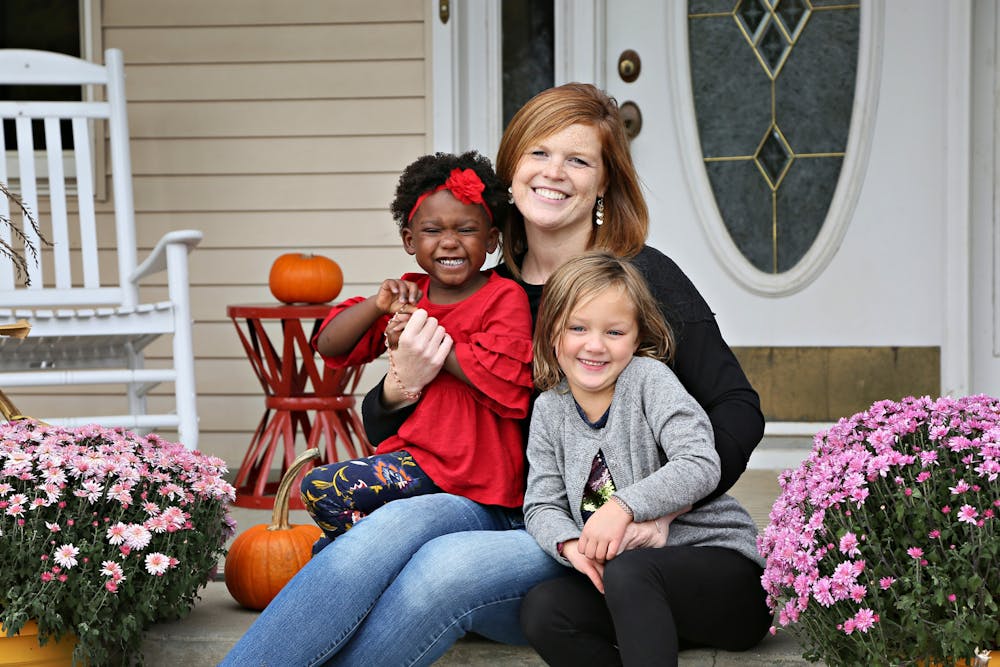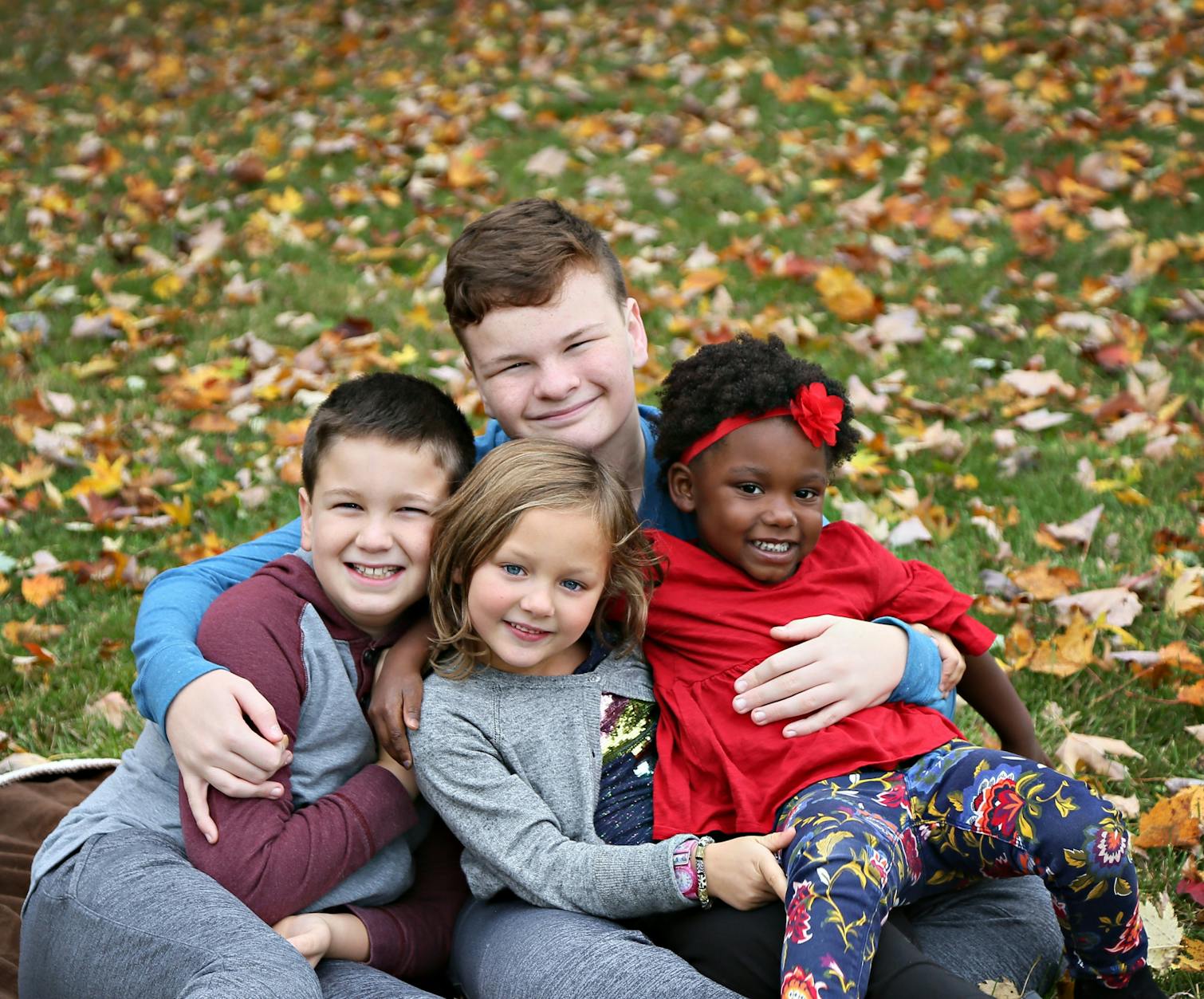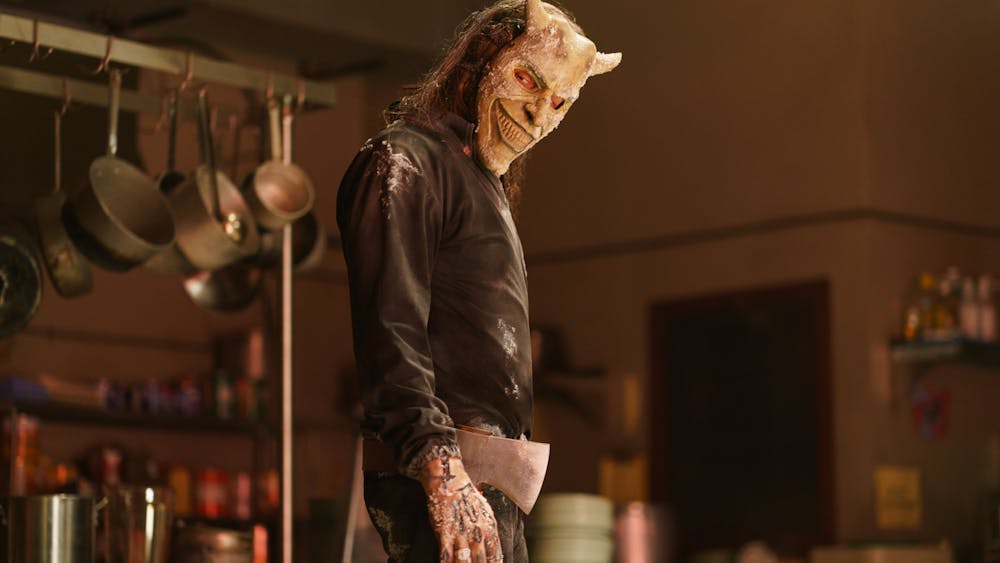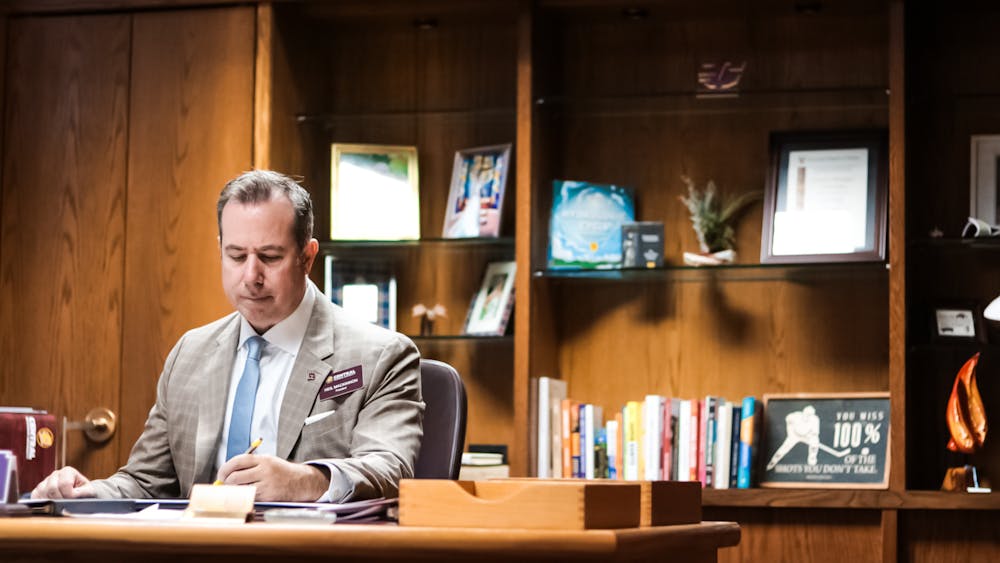Foster label: Hurt or heal?

Rachel Dale (center) poses with her daughters Autumn (left) and Farrah in this 2021 portrait. (Courtesy photo | SK)
The Dale family, previously a local family of four, now a multiracial family of eight, has had 17 children come in and out of their home in hopes of providing a loving and caring home for children in the foster care system.
Rachel Dale and her husband, Adam Dale, have been foster parents for almost eight years. Dale is also a clinical counseling master's student at Central Michigan University.
Rachel Dale said they became foster parents not just for the purpose of adopting, but much more.
"We felt like we had the love and time to give to children that needed it," Dale said.
Dale said that her husband had a foster family take him in when he was in high school.
“He kind of had it always in his head that it was something he would like to do,” Dale said.
A CMU professor, who asked to remain anonymous to protect her privacy, will be referred to as "Jane Doe" for the remainder of this article.
Doe was also placed in the foster system for two years while she was in high school.
“There's a lot of uncertainty associated with being in a foster home because you're a kid, you're a minor,” she said. "There's a lot of adults that are making a lot of decisions for you."
Becoming a foster family
Dale had two biological sons and an unexpected pregnancy that turned into a miscarriage.

Clockwise from left Troy, 10, Jacob, 12, Autumn, 4, and Farrah, 6, Dale play in the grass in this 2021 portrait (Courtesy image | SK)
“After that, we both thought we’d like to have more children and we knew some friends that were foster parents,” Dale said.
At this point of time, Dale and her family have been living in Livingston County.
She got connected with the Livingston County Michigan DHHS (Department of Health and Human Services) to become foster parents and are now licensed foster parents by the Isabella County DHHS.
“They came out and did a home study, we filled out quite a bit of paperwork and did a certain amount of training hours,” Dale said. “The whole process took about six months to get licensed and finalized.”
According to the Michigan DHHS, in Michigan, there are approximately 10,000 children in foster care and nearly 200 children who need an adoptive family.
Dale said now they have two foster daughters they are in the process of adopting.
“Over the eight years, we’ve had 17 children come in and out of our home,” she said. “It’s been an amazing experience, but also it’s really hard at the same time.”
Dale said when they take in a child, it's a mix of nervousness and excitement.
“Excitement because we are blessed to have the space to welcome in the child, but nervous because you just never know what they’ve been through and what type of needs they’re going to have or how they’re going to need us to help them as well,” Dale said.
Battling racism
The family also received comments about being a multiracial family, Dale said.
“We’ve had random strangers come up and ask us where our daughter, who is Black, is from and we're like, 'Michigan,'” Dale said. “People we don’t even know just feel the need to come up and ask us.
We were pushing (Autumn) in a stroller and had somebody yell out from their car racial slurs at her as a baby,” Dale said. “I have had friends or family make comments like, 'She must like fried chicken and watermelon or she's gonna be a really great athlete.'”
Dale have challenged their friends and family who have made statements like that.
“Most of the time, I think they’re just naive or think they are being funny but as her mom, I feel like it’s my job to advocate that saying that stuff is not okay," she said.
She said that having those experiences have shown her and her family how to have more open minds and to be considerate.
“It's really taught us more about Black culture and things like what she would need for her hair or for her skin,” Dale said. “It was one of those things we didn’t really think about going in, fostering her and adopting her.
She really wanted braids with beads so I asked around and we found a lady who is able to style her hair the way she wanted,” said Dale. “But, what was good is she was able to say that she knew her hair was different and that wanted different styles.”
Dale said that Autumn is aware of their differences but it doesn’t change their relationship.
“She said several times before that she knew her skin color is not the same as mine but (Autumn said) 'It's okay because you're still my mom,'” she said. “She seems at this age pretty confident in who she is.”
Dale said that her older boys, Jacob and Troy, and her older daughter, Farrah, are very protective over Autumn.
“I remember there was a Black Lives Matter march in downtown Mount Pleasant and my kids were like, 'Yes we need to do this,'” Dale said. “They are very protective over each other, so anytime they hear any type of racism of any ethnicity or race, they call it out.”
The importance of support
Dale said one of the main responsibilities of being a foster parent and now adoptive parents, is to support the children that come in.
“I think something that people don’t quite anticipate is how when you have the children in your home and they’re going back and forth between visits with their parents, watching them be confused and not understand what’s happening is something that was the hardest for us,” Dale said. “We instantly connected with these children … we cared for them like they were our children and wanted what’s best for them.”
Dale said it’s hard watching kids go through such hard times at such a young age.
“Our 7-year-old had a lot of attachment trauma … she was in counseling when she was 2,” Dale said. “To be so upset and not be able to verbalize because she just didn’t understand was really hard to watch.”
According to the National Library of Medicine (NLM), kids in foster care are more likely to have experience with violence, abuse or neglect.
“The court system doesn’t seem to really view the children as children but as just another case,” Dale said. “The kids are not always the number one priority which I think is the hard part as a foster parent.”
Michigan CASA (Court Appointed Special Advocates) is a specially trained community volunteer appointed by a judge to speak for the best interests of an abused or neglected child.
According to Michigan CASA, as of 2023, 10,107 children are abused or neglected. Of those children, 1,323 are served by CASA. Currently, Isabella County is an unserved area.
“It is estimated that approximately 90% of children in foster care have experienced a traumatic event, according to the NLM. “Nearly half report exposure to four or more types of traumatic events.”
Dale said when the kids go home, she hopes that their parents are doing well and ready to care for them. Unfortunately, she said, that isn't always the case, and children do end up back in the system.
"You just know they experienced more trauma," she said.
CMU anonymous professor, who goes by Doe in this story, recalls the doubt she felt when entering a foster home. She started having troubles with assurance.
“I didn't always know who I could trust," Doe said.
Dale said it’s nice to connect with other foster families and be supportive with each other.
“Maybe a child went home and you’re missing them and grieving the loss of them,” Dale said. “It’s really nice to know people that have gone through very similar situations.”
When needed, she and her husband had their own support system, Dale said.
“My sister was a big support with babysitting and helping us out with our boys when they were young,” Dale said. “Since moving here (to Isabella County) we have been really thankful to find a really great babysitter that has been supportive and basically watched our kiddos grow up.”
Dale said being a student and a foster parent is like having a second career.
“I wouldn’t have had all this life experience in my undergrad years, so I feel like now after going through these eight years of being a foster parent, and now adoptive parent, I can really empathize with what kids and families have gone through,” Dale said. “Since I’ve seen a lot of things firsthand, I am hoping that I can really help people as they go through their events that are similar.”
Doe said she felt she lost her sense of belonging when going back to her original home and school.
“I think there's a lot of stigma associated with being in foster care and I understood that stigma, which made it challenging," Doe said. “Being in a foster home then going back to your original high school … I just think that there was a loss of a sense of belonging, and it's not something that a lot of people talk about.”
Doe recalled how being split from her sibling when a foster home didn't have a home for the four of them was painful. Reuniting with them, and then reuniting with her parents, was gradual.
“We had monitored visits where the caseworker would observe us interacting with our parents in a room at CPS, then we would go on monitored outside visits to the park or getting ice cream and then we were able to go away for an afternoon unmonitored,” she said.
Doe and her siblings (a sister and brothers) were able to slowly spend more time with their parents.
“We eventually were able to go for weekend visits, so it just increased in time,” she said. “It was nice to be back home.
"I just feel like we all have this thing … this is our thing, just the four of us, we have this together."
New home, new family, new habits
Dale said for her and her family, it's ultimately about doing what's best for a child and their home.
“I want them to know that they have a family that will never leave and will always love them,” she said.
Dale recalls an experience with her 9-year-old daughter when she was 3 that broke her heart.
“I had told her goodnight one night and I said 'I love you,'” Dale said. “At 3 she said 'if you stop loving me, I’ll just go to another home.'”
That has changed now.
“She’s in fourth grade now and she wrote something about how she knows that she’s loved,” Dale said. “I think ultimately that is our goal for our kids, even the ones that haven’t stayed … that they’ll always have a place in our heart and in our home."
For more information, to donate or become a volunteer for Michigan CASA, call 616-259-7200 or email at information@michigancasa.org.






